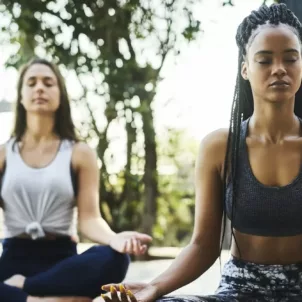You’ve likely heard of—and almost surely have experienced—the many benefits of sharing quality experiences with friends and loved ones. Less touted, however, are the upsides and importance of alone time.
Some people even notice negative consequences from lacking adequate time spent in solitude, culminating in a phenomenon recently called aloneliness.
To better understand the breadth of solitude and the benefits of spending time alone, we spoke with Thuy-vy T. Nguyen, PhD, an assistant professor of social psychology at the University of Durham. She’s also a leading researcher at Solitude Lab, where she explores the different factors that determine whether participants perceive solitude as pleasant or unpleasant.


The Importance of Alone Time
Curious to understand why alone time is important? “In our studies, we discovered that spending time alone provides the opportunity to regulate our arousal levels,” Dr. Nguyen begins. Such kinds of arousal run the gamut from excitement and enthusiasm to anger and anxiety. “It’s good to carve out time for solitude when these feelings arise,” she continues, as stimulation abates in solitary settings. Even further, she explains that doing so permits you “to engage in successive experiences more refreshed and rejuvenated.” Additional studies demonstrating the benefits of solitude are still in their infancy. Still, many people experience benefits such as heightened creativity, greater empathy, and strengthened social ties.Why do some people prefer to spend more time alone than others?
And on that note, is wanting to be alone normal? We live in age in which it’s expected to stay digitally connected via smartphones and social media. With that said, many of us are no longer used to—or even comfortable with—good, old-fashioned alone time. In fact, some have grown so accustomed to chronic stimulation that they’d flat out prefer pain to solitude. Across 11 studies by UVA published in 2014, a quarter of women and two-thirds of men opted to receive an electrical shock than to sit alone undisturbed. However, there are certain types of people who desire, and even crave, moments of quietude and stillness. “Some people have tendencies or personality characteristics that are more predictive in their interest for solitude, such as those with dispositional autonomy,” Dr. Nguyen explains. These types of people “take interest in their own experiences and do things that reflect their values and what they [intrinsically] believe,” instead of being more privy to externally imposed expectations and demands. “They’re more likely to find solitude enjoyable and embrace the opportunity to be alone,” she continues. Yet importantly, as psychoanalytic political theorist Matthew Bowker notes in a March 2017 article in The Atlantic, solitude isn’t exclusively limited to contained conditions. Instead, he says, “the value of solitude depends on whether an individual can find an interior solitude,” regardless of setting. Whether that happens a quiet room, on a walk, or in the middle of Times Square isn’t necessarily important.
Loneliness vs. Aloneliness
It’s important to recognize that while solitude can get a bad rap, it doesn’t require negative connotations. Put simply, feelings of loneliness can arise when you’re by yourself yet don’t want to be. But on the flip side, aloneliness encompasses an internal desire for solitude. The key differentiation between the two is whether you make a conscious, active choice to be alone (i.e., whether or not it’s self-imposed). Along these lines, an additional consideration is whether you have the opportunity to re-enter social situations at will.pleasant vs. UNPleasant Solitude
At Solitude Lab, Dr. Nguyen conducts experiments investigating authentic/pleasant solitude versus inauthentic/unpleasant solitude (thus far in sample populations across the US and UK). Here’s how they differ.Authentic Solitude
In the midst of authentic solitude, you can engage in “things related to the satisfaction of psychological needs, such as autonomy, confidence, and the freedom to perform activities you find intrinsically interesting,” Dr. Nguyen explains. Essentially, such activities will be rewarding, so long as they fulfill desires that you set for yourself. They can range from working out to maintain a healthy body and mind, to solving puzzles for a sense of achievement and overcoming a challenge. Dedicated self-care also falls under this category. “Alone time is when you can take care of your own needs and not think about what other people want,” says Dr. Nguyen. “It’s also a great opportunity for self-reflection, which can lead to insight and better understanding of oneself.” So-called me time is essential to evaluate your goals, values, and true desires independent of other people and culture at large.Inauthentic Solitude
Inauthentic solitude, on the other hand, can be disempowering and defeating. Regarding this unpleasant experience of time alone, Dr. Nguyen says that “people tend to report negative events or regrets, as well as feeling ineffective, like a failure, and isolated.” If you ruminate over stressful scenarios or consistently engage in negative self-talk, your alone time may fall under this category and work against you. On a positive note, she’s pleased to find that her study participants generally experience more authentic than inauthentic solitude.
Final Thoughts
By now, you’ll understand that alone time is important. Yet still, Dr. Nguyen reminds us that the value of solitude doesn’t cancel out the need for healthy relationships and regular social interactions. “We tend to misunderstand the idea that solitude is something that’s incompatible to our nature as social beings. I haven’t seen the two pitched against each other in our works,” she begins. In essence, she indicates that social and solitary experiences aren’t mutually exclusive, and you can always enjoy the diverse benefits of both. Furthermore, valuing solitude isn’t merely a question of introversion versus extroversion. “Extroverts also need time to rest and be by themselves,” she says. “Too much social interaction can fatigue them,” just like anyone else. All things considered, solitude is neither inherently good nor bad. It’s how you perceive, use, and embody it that counts.More like this









